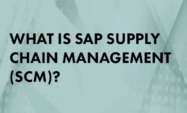SAP Supply Chain Management
SAP APO | SAP Asset Management | SAP Business Network | SAP Digital Manufacturing Cloud | SAP Digital Twin | SAP EWM | SAP IBP | SAP Inventory Management | SAP Label Printing | SAP Logistics | SAP Manufacturing | SAP Manufacturing Automation | SAP MES | SAP MII | SAP MM | SAP MRO | SAP MRP | SAP Order Management | SAP Plant Maintenance | SAP PLM | SAP Production Planning | SAP S&OP | SAP SD | SAP SPM | SAP Supply Chain Planning | SAP Track and Trace | SAP Transportation Management
Filter By
Browse By
- SAP Analytics and AI
- SAP Application Development and Integration
- All SAP Application Development and Integration
- SAP ABAP
- SAP ABAP Development Tools
- SAP ABAP Test Cockpit
- SAP API Management
- SAP BAPI
- SAP Basis
- SAP BRF
- SAP Business Application Studio
- SAP CMS
- SAP Design Studio
- SAP Development Tools
- SAP DevOps
- SAP EAI
- SAP EDI
- SAP Extension Suite
- SAP Fiori
- SAP Fiori Elements
- SAP Integration Suite
- SAP Low Code Application Development
- SAP Low Code Automation
- SAP Netweaver
- SAP Release Management
- SAP UI5
- SAP Web Application Server
- SAP Web IDE
- SAP Business Process Management
- SAP Center of Excellence
- SAP CIO
- SAP Customer Experience
- SAP Data and Data Management
- All SAP Data and Data Management
- SAP BW
- SAP BW/4HANA
- SAP Crystal Reports
- SAP Data Archiving
- SAP Data Center
- SAP Data Governance
- SAP Data Integration
- SAP Data Migration
- SAP Data Quality
- SAP Data Services
- SAP Data Strategy
- SAP Data Visualization
- SAP Data Warehouse Cloud
- SAP DMS
- SAP Document Control
- SAP EIM
- SAP ETL
- SAP ETL Tools
- SAP HANA
- SAP HANA Administration
- SAP HANA Deployment Infrastructure
- SAP HANA Studio
- SAP Master Data
- SAP Master Data Governance
- SAP MDM
- SAP Enterprise Architect
- SAP Enterprise Asset Management
- SAP ERP
- SAP Finance
- All SAP Finance
- SAP Accounting
- SAP AR AP
- SAP Asset Accounting
- SAP Billing Systems
- SAP BPC
- SAP BRIM
- SAP Cash Management
- SAP Central Finance
- SAP Controlling
- SAP COPA
- SAP Cost Center Accounting
- SAP Currency Risk
- SAP e-invoicing
- SAP FICO
- SAP Finance Automation
- SAP Advanced Financial Closing
- SAP Financial Consolidation
- SAP Financial Planning
- SAP FX Risk
- SAP General Ledger
- SAP Global Tax Management
- SAP Hyperion
- SAP Order to Cash
- SAP Payment Processing
- SAP Profitability Analysis
- SAP Rebate Management
- SAP S/4HANA Finance
- SAP SWIFT Compliance
- SAP Treasury Management
- SAP Universal Journal
- SAP Governance Risk and Compliance
- SAP Human Capital Management
- SAP Intelligent Technologies
- SAP Platform and Technology
- All SAP Platform and Technology
- SAP Business Technology Platform
- SAP Cloud
- SAP Cloud Connector
- SAP Cloud Integration Platform
- SAP Cloud Migration
- SAP Cloud Platform
- SAP Cloud Providers
- SAP Cloud Strategy
- SAP Digital Signature
- SAP Container Platform
- SAP HANA Enterprise Cloud
- SAP Digital Asset Management
- SAP Smart Forms
- SAP HEC
- SAP Digital Integration Hub
- SAP Hyperscalers
- SAP Infrastructure
- SAP Messaging
- SAP Quality and Testing
- SAP Security
- SAP Spend Management
- SAP Supply Chain Management
- All SAP Supply Chain Management
- SAP APO
- SAP Asset Management
- SAP Business Network
- SAP Digital Manufacturing Cloud
- SAP Digital Twin
- SAP EWM
- SAP IBP
- SAP Inventory Management
- SAP Label Printing
- SAP Logistics
- SAP Manufacturing
- SAP Manufacturing Automation
- SAP MES
- SAP MII
- SAP MM
- SAP MRO
- SAP MRP
- SAP Order Management
- SAP Plant Maintenance
- SAP PLM
- SAP Production Planning
- SAP S&OP
- SAP SD
- SAP SPM
- SAP Supply Chain Planning
- SAP Track and Trace
- SAP Transportation Management
- SAP System Administration
SAP Supply Chain: Supply Chain Management
A well-managed supply chain can significantly reduce a company’s operating expenses and increase profits. A supply chain requires active management because it is affected by many factors outside the control of the business. Current events causing global supply chain disruptions include the Russia-Ukraine War and the continuing effects of COVID-19.
SAP Supply Chain: Supply Chain Management
A well-managed supply chain can significantly reduce a company’s operating expenses and increase profits. A supply chain requires active management because it is affected by many factors outside the control of the business. Current events causing global supply chain disruptions include the Russia-Ukraine War and the continuing effects of COVID-19.
Supply chain management is the flow of goods or services between businesses and various locations to get goods to consumers faster and at less cost. Supply chain management encompasses a thread of activities from design and manufacturing to delivery and operations.
Components to enable a resilient and sustainable supply chain management process are:
- Designing recyclable and sustainable products
- Delivering products with low carbon impact
- Planning to reduce emissions and ethically source materials
- Operating in an energy efficient and safe manner
- Manufacturing with minimal waste and environmental impact.
Accurate information helps manufacturers and retailers produce and transport only what they can sell, eliminating unnecessary expenses. Consider simplification by integrating demand planning in the cloud. Predictive analytics, automation, and Internet of Things (IoT) technologies can connect and simplify processes, allowing you to gain visibility across forecasting, response and supply, replenishment, and inventory.
Key Capabilities of Supply Chain Management:
- Supply Chain Planning: Agile market-driven plans with visibility, collaboration, and intelligence.
- Supply Chain Logistics: Fast, efficient, and sustainable logistics.
- Manufacturing: Streamlining with artificial intelligence, loT, and integration.
- Product Lifecycle Management: Connecting systems, people, and processes with end-to-end digital innovation.
- Enterprise Asset Management: Improving asset performance and reliability.
Benefits of Supply Chain Management:
- Optimizing the flow of materials, products, and information.
- Improving data visibility.
- Enhancing financial practices and cost cutting.
- Improving vendor relationships.
- Operating with lean and on-demand inventory.
- Reducing liability and risk.
Key Considerations for SAPinsiders
- How to Deliver Greater Visibility into the Operational KPIs that Drive Your Business. In this webinar, hear insights from SAP around how to build a powerful analytics foundation. Discover how to focus less on historical KPI’s and more on predictive process automation, how to reprioritize KPIs that show historical performance, develop operational decision support for end-to-end supply chain processes, and stop development of custom reporting.
- 5 Ways to Enhance Your SCM with Smart Data. Explore expert insights from Robert Brice, President and CTO, RFgen. Start with the basics for a digital transformation of your supply chain, discover how to gain competitive advantage by implementing efficiencies, address inefficiencies, shortage of labor, and address security.
- Salling Group Expands Its Market Reach With SAP. In this article, see how Salling Group used SAP ERP to ensure data uniformity, enhance warehouse efficiency, and consolidated logistics transactions with Redwood.
278 results
-

Compatibility Scope For SCM Items & How You Can Solve That
Reading time: 7 mins
When SAP S/4HANA was introduced, SAP tried to get rid of redundant old functions (Simplification) to reduce the effort of support etc. For some other functions, SAP granted limited usage rights till the end of 2025 resp. 2030 (Compatibility Packs/Scope/Package/…). Positive list of compatibility packs as documented in SAP Note 2269324 and referenced in the…
-

What is SAP Supply Chain Management (SCM)?
Reading time: 3 mins
SAP Supply Chain Management (SCM) enhances supply chain efficiency and effectiveness through features like end-to-end visibility and predictive analysis, addressing challenges such as demand volatility and resource wastage to improve consumer satisfaction and business performance.
-

Governance is Not Maintenance: Solving the Human Side of SAP IBP Master Data
Reading time: 3 mins
In an interview, Nikki Sheridan emphasizes that effective governance, which focuses on preventing bad data entry rather than just fixing issues, is crucial for successful SAP Integrated Business Planning (IBP) implementation; organizations should prioritize understanding future decisions over current data, ensuring user accountability and process clarity to enhance data quality and system adoption.
-
-

How Supply Chain Orchestration is Reshaping the Modern Enterprise
Reading time: 9 mins
Modern supply chains have transformed into complex, globally integrated systems requiring real-time orchestration and AI assistance to enhance efficiency, agility, and sustainability, positioning them as strategic competitive advantages.
-

Navigating the Uncertainty of U.S. Tariffs
Reading time: 1 min
This paper explores the broader implications of tariff exposure on business models, from corporate governance and transfer pricing to tax planning and commercial strategies. By analyzing recent and historical tariff regimes, it provides actionable insights, highlights key organizational risks, and proposes strategic levers to enhance resilience.
-

Why Master Data Forms the Core of an SAP IBP Strategy
Reading time: 3 mins
Nikki Sheridan emphasizes that treating Master Data and Planning Area design in SAP Integrated Planning (IBP) as a mere technical task can lead to long-term issues, arguing that a well-structured planning area is vital for sustainable business decisions.
-

SAPinsider Expert Exchange – Season 1 Supply Chain Management
Reading time: 1 mins
In this edition of the SAPinsider Expert Echange – Supply Chain Management we highlight two perspectives shaping today’s supply chain landscape: the strategic lens of Reveal’s Martin Rowan and the operational experience of Blue Diamond Growers’ Steve Bergfeld. Across both conversations, a consistent message emerges: supply chains are more complex, more visible, and more essential…
-
-

7 SAP SCM Best Practices for Consumer Products Companies
Reading time: 3 mins
Small- to mid-size consumer products companies can enhance their competitive edge and efficiency by optimizing Supply Chain Management (SCM) processes using SAP SCM, implementing best practices such as clear objective setting, extensive training, customization, integration with existing systems, utilizing advanced analytics, demand-driven planning, and fostering collaboration.
-

Examining SAP SCM and Productivity in the Consumer Products Industry
Reading time: 2 mins
SAP Supply Chain Management (SCM) significantly enhances productivity in consumer products companies by providing improved visibility, collaboration, planning, resource allocation, and continuous improvement through data-driven insights.
-

Why Food Traceability Systems Are No Longer Optional
Reading time: 11 mins
The question is no longer whether traceability matters—it’s how well your system supports it. And in a world where trust and transparency are paramount, investing in integrated, future-ready traceability software is not just a smart move. It’s a vital one. Membership Required You must be a member to access this content.View Membership LevelsAlready a member?…
Featured Insiders
-

-

James Marland
Global Vice President, Sales Excellence, Intelligent Spend & Business Network, SAP
-

S V Prasad Gandhikota
Senior Systems Analyst, Conagra Brands
Become a Member
Unlimited access to thousands of resources for SAP-specific expertise that can only be found here.
Become a Partner
Access exclusive SAP insights, expert marketing strategies, and high-value services including research reports, webinars, and buyers' guides, all designed to boost your campaign ROI by up to 50% within the SAP ecosystem.
Upcoming Events
Related Vendors
Your request has been successfully sent


